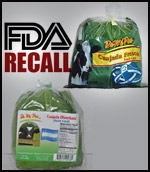When my group started working with the greenhouse vegetable growers in Ontario almost 20 years ago, the general manager explained why he reached out to me.
 “I have this recurring dream, where a supermarket manager is on the phone from Florida, and he’s got a customer that says she’s sick, and it was our tomatoes.”
“I have this recurring dream, where a supermarket manager is on the phone from Florida, and he’s got a customer that says she’s sick, and it was our tomatoes.”
They’ve never had an outbreak largely due to preventative planning.
Kathy Hardee, co-chair of the Food & Agriculture Industry Group at Polsinelli, PC, which is composed of a team of attorneys from every legal practice area and who each have a focused background in the food industry, writes in Food Safety Magazine that there may be no word that strikes greater fear in the hearts of individuals in the food industry than “recall.”
Mere consideration of the term may mean that someone has been made ill or possibly died from consumption of or exposure to a food product. The response must be inordinately fast. You will be coordinating with government agencies, such as the U.S. Food and Drug Administration (FDA), the U.S. Centers for Disease Control and Prevention (CDC), state governmental agencies as well as other companies who sit both upstream and downstream of your position in the distribution chain of the food product at issue. The aftermath can leave injured consumers and damaged or destroyed reputations. The monetary costs may include lost profits, recall expenses, civil damages and potential criminal action. Despite excellent quality control, you may find yourself swept into a recall. Advance planning for recalls can save lives and can make the difference in the survival of your company.
Recalls may be conducted on a company’s own initiative, by FDA request or by FDA order under statutory authority. Recalls are utilized to protect consumers (both human and animal) from products which pose a risk of injury or gross deception or are otherwise defective. In the most serious of circumstances, manufacturers are required to report to the FDA’s reportable food registry within 24 hours of learning that a food presents a reasonable probability that the use of, or exposure to, such article of food will cause serious adverse health consequences or death to humans or animals (Class I Recall). Where the probability becomes more remote and/or the potential impact less severe, the required response time may be somewhat longer, moving from hours to days (Class II Recall).
 While a written recall plan has long been a regulatory requirement, planning for a recall should include much more than a template form in a file. Recall planning should include record-keeping steps to be taken well in advance of any concerns but which will make any recall effort more effective. A team of advisors who will serve in various roles in the planning, execution and post-recall process is as necessity. And the requirements of a detailed written recall plan are being further clarified under the Food Safety Modernization Act (FSMA).
While a written recall plan has long been a regulatory requirement, planning for a recall should include much more than a template form in a file. Recall planning should include record-keeping steps to be taken well in advance of any concerns but which will make any recall effort more effective. A team of advisors who will serve in various roles in the planning, execution and post-recall process is as necessity. And the requirements of a detailed written recall plan are being further clarified under the Food Safety Modernization Act (FSMA).
